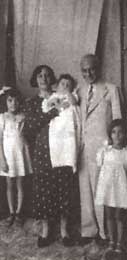|
|
LAST DAYS IN BABYLON: The Story of the Jews of Baghdad By Marina Benjamin,
Bloomsbury, £10.50
The word ‘diaspora’ connotes a sense of loss — a loss laden with regret and punctuated by a longing to return. That is why dollar-happy non-resident Indians are not a ‘diaspora’ in the strict sense of the term, while the Jews have always constituted the archetypal diaspora. But the Iraqi diaspora had grieved less for the biblical homelands than they would do for their Babylonian home of 2,500 years that they finally lost in the early Fifties.
The Baghdadi Jews came to Babylon long before the advent of Islam and could trace their roots to Nebuchadnezzar’s captives. They spoke Arabic, dressed and ate like Arabs, staunchly believed in Iraqi nationhood and remained hostile to Zionism till the farhud (pogrom) of 1941 that killed 200 Jews. They were the wealthiest lot and ran the economy. Iraq had been too kind for them to even attempt to comprehend Zionism, which was European and alien. Beneficiaries of the British occupation of Iraq during World War I, and protected by the westernized King Faisal, Baghdadi Jews would however become the victims of the conflict between pan-Arabism and Zionism.
Last Days in Babylon is the story of how the Iraqi Jewish community, numbering 135,000 in 1940, came down to 22 in 2004. It is the history of a community and of a nation, refracted through the plight of a woman and her family. The woman is Regina Levy, maternal grandmother of the author, Marina Benjamin. Regina, a widow, was lucky to leave Iraq with her three children in the nick of time, before the Jewish denaturalization project of the Iraqi government ended in 1951, and the once prosperous and thriving community was reduced to a ghostly and invisible existence threatened everyday with extinction.
The book tells another interesting story — that of Marina herself. The author grew up in England, at generational and cultural removes from Regina’s girlhood. But the rapid disappearance of the last vestiges of Baghdadi Jewish life, and her grandmother’s death in 1992, made Marina desperate to salvage and preserve what she could of a moribund culture. Thus, in 2004, she became one of the few Iraqi Jews who “schemed to get into the country, rather than out of it, in many decades”.
Benjamin successfully re-constructs a history she did not witness first hand, yet knew to be hers. This history lived in her memory of her grandmother, in her talks with her mother and in family photographs. She contextualizes their story against the predicament of the Iraqi Jews, while illustrating the communal tragedy using the family saga. In fact, Last Days escapes definition as either biography or history because of the ease with which Benjamin changes scale by focusing on the family, and pushing it to the background whenever the world outside assumes greater dramatic potential.
Regina, told by the authorities that her minor children could not emigrate with her, sailed with them for Calcutta in 1950, on the pretext of visiting her sister. The family lived in Chowringhee Lane before moving to England. But, like scores of expatriate Iraqi Jews, they would weep remembering the old Baghdadi mahallah and their relatives left behind. Benjamin weaves these stories of a woman’s extraordinary courage and a national disaster into one nuanced but coherent narrative that instructs and delights.











